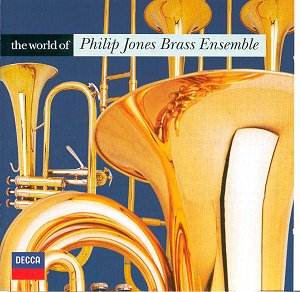The World of the Philip Jones Brass Ensemble
Music for the Royal Fireworks
(HANDEL arr. Elgar
Howarth)
Canzon IV a 6 (GIOVANNI Gabrieli
ed. Philip Jones)
Pavane (John BULL
arr. Elgar Howarth)
The King's Hunting Jigge (John BULL arr.
Elgar Howarth)
La Mourisque from Susato Suite (Tylman SUSATO
ed. John Iveson)
Basse Danse Bergeret from Susato Suite (Tylman
SUSATO ed. John Iveson)
Allegro- Adagio- Allegro from Brandenburg Concerto No. 3
(BACH)
Spitfire Prelude and Fugue (William WALTON
arr. Elgar Howarth)
Fanfare for the Common Man (Aaron
COPLAND)
The Dam Busters March (Eric COATES arr. W.
J. Duthoit)
Entry of the Gladiators (Julius
FUCIK)
Sleeping Beauty-Waltz (TCHAIKOVSKY arr. John
Fletcher)
The Liberty Bell (John Phillip
SOUSA)
The Swan from Carnival of the Animals (Camille
SAINT-SAËNS)
Mack the Knife (Kurt WEILL)
America from West Side Story Suite (BERNSTEIN
arr. Eric Crees)
Baba Yaga and The Great Gate of Kiev from Pictures at an Exhibition
(MUSSORGSKY arr. Elgar Howarth)
 Philip
Jones Brass Ensemble
Philip
Jones Brass Ensemble
 Decca 467 785-2 [AAD/DDD
69:33]
Decca 467 785-2 [AAD/DDD
69:33]
Crotchet
AmazonUK
AmazonUS

With the recent passing of Philip Jones it was not only a fine trumpet player
that the musical world lost. Jones was an ambassador for both his profession
and the cause of putting brass ensemble playing firmly on the map. In this
he succeeded almost single-handedly and in doing so created the inspiration
for a generation of brass players as well as the formation of many other
ensembles along similar lines. Jones retired from playing in 1986, the ensemble
re-forming under the name London Brass. Even then he continued to work
tirelessly, being appointed Principal of Trinity College of Music and exercising
his other talents as an administrator. In a recent tribute concert broadcast
on Radio Three I recall James Watson, one of Jones' trumpet playing colleagues,
commenting on his self-effacing character, always eschewing the limelight
himself in favour of his younger colleagues: a fitting tribute to a genuinely
caring man.
The music featured on this disc, whilst covering an impressively wide span,
concentrates on the lighter side of the PJBE repertory, comprising (with
one notable exception in the form of Fanfare for the Common Man)
arrangements of baroque and renaissance works as well as arrangements of
familiar classics and marches. The material has been drawn from the large
number of discs that the group released over the years and has been chosen,
understandably, for its mass appeal. What it does not pay tribute to is the
group's policy of commissioning new original music on a regular basis. How
good it would be to think that Decca might give consideration to re-releasing
further discs concentrating on the more serious side of their repertoire.
There is some wonderful music by the likes of Leonard Salzedo, Malcolm Arnold
and Stephen Dodgson which really deserves another airing!.
Many of the baroque and renaissance works on the disc feature the arranging
skills of Elgar Howarth, now known principally as a conductor, but himself
a former professional trumpet player. Renaissance music in particular works
very well on brass instruments, not surprisingly perhaps with a composer
such as Giovanni Gabrieli, whose antiphonally conceived effects suit
the medium exceptionally well. The two short pieces by John Bull are
a delight, particularly the Pavane, Howarth exploiting the warmth
of the group to the full with some wonderfully sonorous sounds emanating
from the middle and lower end of the ensemble. The two short and familiar
Susato pieces are not technically challenging but are given lively
and characterful treatment. What may surprise listeners new to these arrangements
(and purists in particular) is the success with which the Bach
Brandenburg Concerto No. 3 transfers to the medium. Again there is
some impressively fluent playing on display, notably in the final
Allegro where the dovetailing between the various voices is deftly
handled.
Of the "modern" music featured the performance of Fanfare for the Common
Man is a superb example of controlled legato playing, the line of
Copland's famous majestic melody never broken. The arrangement of
Walton's Spitfire Prelude and Fugue also generates some fine
playing. True, the trumpets are audibly straining a little in places but
it hardly detracts from the overall performance when the fugue catches fire
as this does.
In the final year of Philip Jones tenure with the group they recorded a disc
of famous marches, for which they were augmented to a full size wind band
(I well remember buying the disc not realising this and feeling slightly
"swindled", as a brass player myself, that woodwind had been added!). The
three marches included here are played with exceptional tautness. I would
single out Entry of the Gladiators in particular, which has real swagger,
guaranteed to bring a smile to the face!
The highlight of the disc however is unquestionably Baba Yaga and
the Great Gate of Kiev from Pictures at an Exhibition.
Elgar Howarth's transcription is masterful (probably the finest of all of
his many arrangements), the playing immensely powerful and astonishing in
its impeccable balance and virtuosity in the transition between the two
movements.
Admittedly there are a few quibbles. The arrangement of the Waltz from
Tchaikovsky's Sleeping Beauty for four tubas (all parts
multi-tracked by John Fletcher) is a novelty item which I am afraid does
nothing for me at all, even though the playing is impressive. In addition
Eric Crees' arrangement of the Symphonic Dances from West Side
Story is a fine transcription but not when America is horribly
"hacked" from the complete arrangement as it is here. The same criticism
can be levelled at Mack the Knife. Overall however this is a fine
compilation which serves not only as an excellent introduction to those who
may be new to the PJBE but also forms a fitting tribute to the man himself
and the quality of British brass playing generally.
Christopher Thomas

